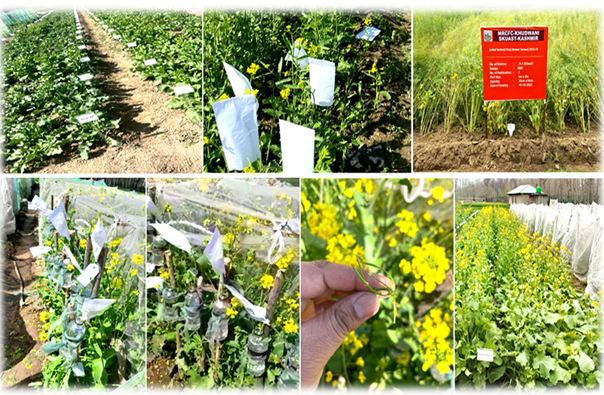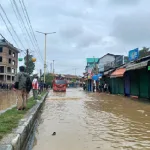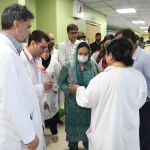India, as the largest agrarian subcontinent, supports 26% of the world’s agricultural population on just 12% of its arable land. This subcontinent also stands as the fifth-largest vegetable oil economy globally, contributing significantly to the production and consumption of oilseeds and edible oils. However, despite being a major producer, India meets 57% of its edible oil requirements through imports, a scenario echoed in the Union Territory (UT) of Jammu and Kashmir. This dependency highlights the need for sustainable strategies to boost local production and achieve self-sufficiency.
Current Scenario and Challenges
In Jammu and Kashmir, oilseed cultivation, particularly rapeseed-mustard, forms an integral part of the agrarian landscape. Brown sarson (Brassica rapa L.), the predominant oilseed crop, fits well in the traditional oilseed-paddy rotation system prevalent in the Kashmir valley. However, the productivity of brown sarson remains low, ranging between 6-8 quintals per hectare, primarily due to factors such as improper sowing dates, uneven topography, and the use of traditional low-yielding varieties that are susceptible to biotic and abiotic stresses.The region’s productivity is also hampered by inadequate infrastructure, poor irrigation coverage, and the lack of a cohesive government policy. While 70% of cereals are irrigated, only 27.8% of oilseeds benefit from irrigation. The valley’s harsh climatic conditions, with extended periods of snow and frost, further restrict crop growth and lead to significant yield losses.
Role of Research and Technological Interventions
The Sher-e-Kashmir University of Agricultural Science and Technology (SKUAST-Kashmir) has played a pivotal role in addressing the challenges of oilseed production in Jammu and Kashmir. The Mountain Research Center for Field Crops (MRCFC) in Khudwani has been at the forefront of developing high-yielding, stress-resilient varieties of rapeseed-mustard. Notable among these are KS-101 (Guchin) and the Shalimar Sarson series (I, 2, and 3), which have demonstrated significant productivity gains. Under optimal conditions, these varieties yield up to 15 quintals per hectare, while our new pipeline developed varieties under minikilt testing exhibit a potential yield exceeding 21 quintals per hectare.To further boost productivity, SKUAST-K has emphasized comprehensive crop management practices. These include optimal sowing dates, improved fertilizer regimes, effective weed control measures, and innovative planting techniques such as raised bed planting. These practices aim to maximize the genetic yield potential of new varieties and ensure sustainable cultivation.
Strategies for Sustainable Growth
Enhanced Irrigation and Water Management: Expanding irrigation coverage through micro-irrigation systems and efficient water management practices is crucial. This approach will mitigate the impact of erratic rainfall and ensure consistent crop growth. The use of drip and sprinkler irrigation systems can optimize water usage and improve crop yields.
- Quality Seed Production and Distribution: Establishing seed villages and ensuring the availability of high-quality seeds in isolated conditions can prevent cross-pollination and maintain genetic purity. The breeder and foundation seeds produced at MRCFC are pivotal in this regard. Ensuring farmers have access to certified seeds will enhance the adoption of improved varieties and increase overall productivity.
- Adoption of High-Yielding Varieties: Diversifying from brown sarson to high-yielding gobhi sarson (Brassica napus) varieties, such as KGS-32 and KGS-35, can significantly improve seed and oil content. These varieties, with a yield potential of around 20 quintals per hectare, can bridge the yield gap and enhance overall production. Promoting these varieties through extension services and farmer education programs will be essential.
- Integrated Pest and Disease Management: Implementing integrated management modules for major biotic stresses, including mustard aphid and seed-borne diseases, will protect crops and boost yields. These modules, developed and tested through on-farm trials, have proven effective in real-world conditions. Training farmers on these practices and providing them with necessary inputs will be crucial for successful implementation.
- Market and Policy Support: Establishing a stable and supportive market infrastructure is essential. Policies that ensure fair pricing, minimize import dependency, and support local farmers will encourage increased oilseed cultivation. The government’s initiative to distribute high-yielding seeds for the kharif season is a step in the right direction. Furthermore, creating market linkages and ensuring timely procurement of produce at remunerative prices will motivate farmers to expand their oilseed cultivation.
- Research and Development: Continuous research is vital to develop stress-tolerant varieties and innovative farming practices. Public research spending should be increased to explore new areas for yield breakthroughs and to strengthen the seed chain. Collaborative research initiatives involving universities, research institutes, and private sector players can accelerate the development and dissemination of cutting-edge technologies.
Health Benefits and Economic Implications
One of the critical motivations for achieving self-sufficiency in oilseed production is to eliminate the dependence on imported oils, which are often adulterated and harmful to health. The valley has been suffering from various health ailments due to the consumption of such imported oils. By cultivating our own mustard and producing pure, high-quality oil, we can significantly reduce health risks and improve the overall well-being of our population. This shift towards self-reliance in oilseed production will not only ensure a steady supply of healthy oil but also foster a sense of pride and ownership among local farmers.
Urging Farmers to Grow Mustard
Farmers in the valley are encouraged to embrace mustard cultivation. By doing so, they will contribute to a healthier community, boost their incomes, and enhance the region’s agricultural sustainability. The adoption of high-yielding, stress-resistant varieties, along with best agronomic practices, will ensure profitable and sustainable mustard farming.
Moving Forward
The journey towards self-sufficiency in oilseed production in Jammu and Kashmir is challenging but achievable. By adopting a holistic approach that combines technological interventions, improved agronomic practices, and supportive policies, the region can enhance its oilseed productivity and reduce its dependency on imports. This not only ensures food security but also contributes to the socio-economic development of the valley.The strides made by SKUAST-Kashmir and MRCFC Khudwani in developing high-yielding varieties and sustainable farming practices are commendable. However, sustained efforts and collaboration among scientists, policymakers, and farmers are essential to realize the full potential of oilseed cultivation in the region.As we move forward, it is imperative to address the existing challenges and leverage the opportunities to make Jammu and Kashmir a model for sustainable oilseed production. With concerted efforts, the valley can achieve self-sufficiency in edible oil consumption, paving the way for a prosperous and sustainable future. The health and economic benefits of this transition will be profound, providing a safer and more secure future for the entire community.
Conclusion
The path to self-sufficiency in oilseed production in Jammu and Kashmir is clear. It requires a concerted effort from all stakeholders to implement the strategies outlined above. By focusing on research and development, enhancing irrigation and water management, producing and distributing quality seeds, adopting high-yielding varieties, managing pests and diseases effectively, and providing market and policy support, the region can achieve its goal. This will not only ensure a steady supply of healthy oil but also improve the socio-economic conditions of the valley, making it a model for sustainable agriculture.
(Author is Scientist- MRCFC-Khudwani, SKUAST-Kashmir Visiting Scientist University of Nebraska Lincon, USA. Feedback: [email protected], [email protected])








